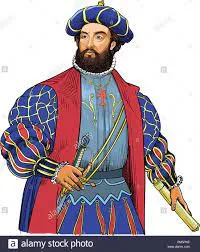During the renaissance period, there was a great love for culture and scientific discoveries and people made scientific examinations of the natural world. These curiosities led to many inventions and scientific discoveries and ultimately to geographic explorations beyond Europe. These explorations were undertaken by the Europeans for various reasons such as to gain direct access to the riches of Asia. In the 1400s CE, Muslim and Italian merchants controlled trade between Europe and Asia. Muslim merchants brought prized goods till the Mediterranean posts and from there Italian merchants carried to different European markets. Therefore, in finding an alternative route, it sparked enthusiasm in European nations- firstly Portugal followed by Spain. Soon it became a race for European nations leading to a new age called “Age of Explorations” also known as “Age of Discovery.”
The Age of Exploration (also called the Age of Discovery) began in the 1400s (i.e., 15th Century CE) around the same period as the renaissance. It was a period when the European nations began exploring the world. They discovered new routes to India, much of the Far East, and the Americas bringing several impacts on their explored routes.
The Age of Enlightenment (The period of inventions and discoveries)
The period saw several developments of new technologies and ideas leading to inventions of cartography (map-making), navigation (compass and sailing), and shipbuilding.
European Explorers and the ‘New World’
Several European countries ventured into exploration sailing across the Atlantic Ocean on a better crafted ‘caravel’ ships which helped the explorers enhanced their ventures more swiftly, leading to the discovery of several new land including America which they termed as ‘New World.’ Portuguese began the exploration followed by Spanish, French, Netherland and British. The European exploration were due to the following reasons:
- Curiosity- people wondered who and what else was out there in the world.
- Hunt for Wealth/resources- many people explored in order to find their fortune.
- Fame- some people wanted to go down as a great name in history.
- National pride- More the exploration, more authority gathered by a country.
- Religion- Spread and bring about increasing numbers of Christianity followers.
- Foreign Goods- Increase the exchange of goods to generate profit.
- Better Trade Routes- Better trade routes offered greater opportunities of accumulation of resources needed in the country.
Prince Henry, The Navigator
The exploration of the world was led by the Portuguese who discovered several trade routes over the oceans and the new land. Among the notable leaders in exploration, the Portuguese Prince Henry (called ‘Henry, The Navigator’) initiated the maritime trade with other continents. His exploration took place mainly at the West Coast of African continent.
 |
Christopher Columbus and America
Christopher Columbus, an Italian navigator, was supported by Spanish Kingdom landed in America by 1492. After his return to Europe, the news of his ‘new found land’ was reported to the Spanish Monarchs. Columbus returned to Europe with numbers of Native Americans and loads of resources. Few of Columbus’s men remained back in America and started the settlement.
 |
Vasco Da Gama and India
Vasco Da Gama, a Portuguese navigator sailed along the Western African Coast, crossing the Cape of Good Hope (Southern Tip of Africa) and sailing across Indian Ocean and, finally reached at Calicut (in Kerala) in the Southern India by 1497. His exploration opened the new routes towards Asian lands which were to be followed by the other European explorers, as far as Far East China.
 |






0 Comments